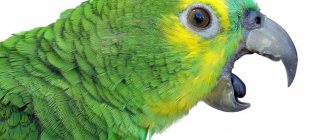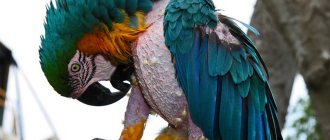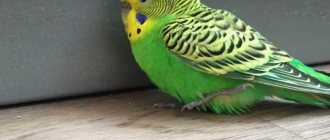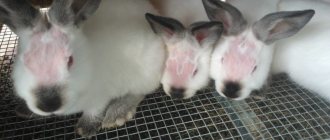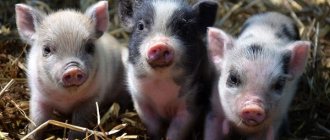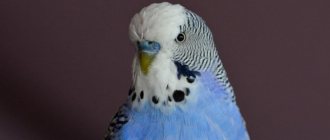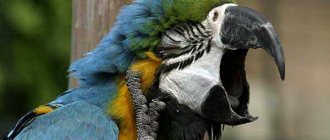- home
- Parrot
- Treatment
02/19/2019 From time to time, after eating, a parrot may regurgitate grain particles. This phenomenon is considered normal, but do not confuse regurgitation with vomiting. Unexpected vomiting in a budgie can be the cause of a very serious and dangerous illness. To identify vomiting in a bird, you need to know the symptoms, and most importantly, what are the reasons for its occurrence.
Behavior when feeling unwell
Vomiting is a symptom of the onset of a certain disease, and not an independent disease. When vomiting, a parrot spits out the contents of its intestines or crop: particles of grains and other food that it could not digest. The owner can understand that something is wrong with his pet by the characteristic twitching and shaking of the head in different directions.
Also, the appearance of the parrot becomes unkempt. His feathers are ruffled, his wings stick out crookedly and fluff is falling out of them. The bird begins to emit an unpleasant odor due to the mucus covering its body. Sometimes he can shrink into a ball and behave completely quietly for a long time. This depends on the fact that it is easier for him to stand on his paws due to the imbalance in the body. To cope with the disease, the bird needs more rest, so it sleeps a lot.
How to help your pet?
Determining the root cause
Self-diagnosis
It is better not to try to do this on your own. It is not so difficult to distinguish mechanical damage from poisoning, but in the case of infections, the owner as a diagnostician is powerless.
Vomiting in a wavy
It is also difficult to understand the root cause:
- the pet hit its head, resulting in a concussion;
- swallowed a piece of plastic;
- he has parasites inside him... etc.
Only calling an ornithologist will truly be the right choice.
Causes of vomiting
Vomiting in a parrot can be caused by a malfunction of the crop. The crop prepares for the digestion of food. This organ is somewhat similar to a bag. With the help of the crop, the grains become soft, making them easier for the stomach to digest.
When the goiter malfunctions, inflammation of the glands occurs. Because of this, cloudy mucus begins to be released in large quantities. Characteristic features are its viscosity and thickness. The parrot's body reacts extremely negatively to the mucus produced. As a result of attempts to get rid of it, the bird begins to vomit.
Another equally serious cause of vomiting can be gastritis. This disease can manifest itself in two forms: acute and chronic. In the case of gastritis, the stomach becomes inflamed. However, vomiting is not the most dangerous symptom of this disease. Unfortunately, if treatment is not started in time, there can be serious consequences.
Vomiting can also occur if the bird is poisoned. To determine the cause of poisoning, you need to be attentive to drawing up the parrot's menu. Don't think that products that are safe for humans are also safe for your pet. The main causes of poisoning include harmful substances contained in floor cleaning products, as well as other items forgotten near the parrot.
A parrot can also vomit due to improperly selected food. The owner can feed him quite large grains of grain. After which the parrot regurgitates the grains back to get rid of the unpleasant sensation.
Reason two – “I don’t understand what’s mine”
Unfortunately, we speak different languages to parrots, and quite often some misunderstandings arise.
Let's imagine the following situation: you bought a pineapple at the market and decided to treat a bird who had never tried this fruit before.
The bird can interpret such a generous gesture in its own way and instead of food instincts, completely different ones will arise.
Your treat will be perceived as a declaration of love, and the response will not be long in coming.
And according to the laws of nature, what is the highest manifestation of love for parrots?
That's right - regurgitation of food, this is exactly what will happen, don't be surprised.
Problems with goiter
Goiter inflammation is a rather dangerous disease. At the very beginning it is very difficult to determine. At first, the parrot is no different from a healthy one. However, he is reluctant to eat or refuses food altogether. In mild cases, the patient becomes drowsy. He stops reacting to what is happening around him. Despite this, the pet continues to eat normally. With all this, he cannot swallow food, and the food gets clogged in the crop. There is frequent secretion of copious amounts of saliva.
A budgerigar vomits due to blockage of the crop with foreign objects or large grains. To determine the presence of a blockage, the owner needs to carefully examine his pet from all sides. The goiter becomes large, and when pressed with a finger you can feel it hardening. In case of complications, the bird completely stops eating, because there is a severe inflammatory process in the body. The abdomen begins to sag, the mucous membranes become covered with a blue coating and become cold. The patient develops diarrhea and periodically vomits profusely. Wheezing and severe shortness of breath may also occur. The bird's appearance deteriorates significantly. If nothing is done, strangulation may occur.
Damage to the nervous system can also lead to blockage of the goiter. The parrot begins to eat everything, regardless of whether he is hungry or not. In this case, contacting a specialist is mandatory. Only an ornithologist can establish the correct diagnosis and prescribe the correct treatment.
Treatment
If your parrot is vomiting, you should contact your veterinarian as soon as possible for a diagnosis and treatment. Diseases in birds progress quickly, and incorrect or untimely treatment can lead to the death of the pet.
If vomiting occurs, the usual food is removed from the cage and the pet is put on a therapeutic diet. The parrot is given oats and corn grits; If you have diarrhea, you can make rice porridge. Activated carbon is placed in a separate feeder. There must be clean water in the drinking bowl. It should be remembered that after an attack of vomiting, the bird is not fed for 2-3 hours.
Stomach problems
Pathological expansion of the stomach
This disease occurs due to infection of the stomach by a virus. With each stage, the organ expands more and more, which leads to discomfort. The stomach has difficulty digesting food ingested. The main symptoms include a sharp weight loss in the bird without loss of appetite and a change in its appearance. The parrot leads an inactive life, most often sleeping. The excrement contains pieces of food and whole grains of grain. In more complex cases, damage to the brain and spinal cord may occur. Birds often make circular movements. The possibility of paralysis of the legs and epileptic seizures cannot be ruled out. Without proper treatment, the parrot may die.
Gastritis
As a result of inflammation of the stomach, gastritis may occur. Most often, the disease is noticed only after it has become chronic. It is at this stage that vomiting appears. Due to the stagnation of excess food in the intestines, a complication of the disease occurs. In addition to vomiting, this disease can cause damage to the central nervous system, which can lead to seizures. Therefore, you should not self-treat your pet. A veterinarian is best suited to handle the task.
Gastrointestinal diseases
With diseases of the digestive system, the general condition of the parrot’s body worsens. This is often accompanied by vomiting and diarrhea. This happens due to the accumulation of fluid in the abdominal area or swallowing a large volume of air when eating. This is caused by intestinal obstruction or volvulus. This condition is possible due to narrowing of the blood vessels of the gastrointestinal tract, as well as their inflammation. An ulcer or tumor can also cause occasional vomiting.
What other causes of vomiting in a parrot and how to treat them?
If your pet burps or spits out food, there is nothing wrong with a goiter; it could be a symptom of another disease.
Vomiting can occur with the following diseases:
- inflammation of the stomach wall (gastritis);
- poisoning by poisonous plants, food products, toxic volatile substances, tobacco smoke, etc.;
- bacterial infections, fungal, viral diseases;
- inflammation of the pancreas;
- diabetes;
- hypo or hypervitaminosis;
- stressful situations;
- the courtship period, when the parrot regurgitates grains and gives them to his chosen one.
Most causes of vomiting in wavy cats need to be treated. Poisoning and infections are especially dangerous. They lead to very rapid death of birds.
It is worth noting that any diseases of budgies in the first stages are hardly noticeable, since this is how nature intended them to be. In the wild, a sick bird is beaten to death, which saves the young. Therefore, this species of birds very often hides symptoms, masks them and creates the appearance that everything is in order.
In case of inflammation of the stomach walls (gastritis), the budgerigar is transferred to soft food, cereals, and appropriate therapy is also carried out. If a bird is poisoned, then first of all you need to exclude the source of toxic substances from the conditions in which the bird is kept. The next thing to do is give your feathered pet activated charcoal and contact a veterinarian.
As a rule, in case of poisoning and infections, the bird may tremble. This means that the parrot is very cold. Place the cage under a lamp, but be careful not to overheat.
Carry out any therapeutic measures under the supervision of experienced veterinarians and ornithologists. Remember that your pet’s health depends on how you treat it, and its life is in your hands! Take care of those you have tamed!
Poisoning
Often, due to their excessive curiosity, parrots eat various small objects that are not intended for food. The consequence of this can be food poisoning, which leads to painful sensations in the stomach. Often, a bird can be poisoned by medicine forgotten near it. During poisoning, the parrot constantly vomits and swears. It is very important to immediately seek help from a doctor to avoid the death of your pet.
When to go to the vet
If you don’t know what to do and what to do at the moment, if the parrot is choking and vomiting food uncontrollably, you need to consult a doctor. For a consultation or to call him at home.
If a bird is vomiting, the best thing to do if you lack treatment skills is to call a specialist or go to him for an appointment. Only professional treatment will return the bird to health.
Poor care
One of the simple causes of vomiting can be non-compliance with poultry management standards. Not only the health of the bird, but also its future life depends on proper care. In the room with the parrot, a comfortable temperature of 20–25 degrees must be maintained. Under no circumstances should drafts be allowed. Temperature changes negatively affect your pet's immunity.
Sometimes improper feeding can lead to vomiting. You can’t suddenly change the type of food you eat, because the bird’s body takes a very long time to adapt. It is necessary to comply with the norm of protein, vitamins and minerals to avoid allergies and subsequent vomiting. The owner must monitor the amount of food the parrot eats to avoid overfeeding.
Regurgitation or vomiting?
Regurgitation is the norm of behavior of an exotic beauty, a way to show love to the owner or other birds, and also part of the process of feeding chicks. Vomiting is one of the symptoms of a problem in a pet’s body, in which the pet needs human help. How can you tell if a parrot is burping or vomiting?
- When vomiting, the bird usually moves its head from side to side, and when regurgitating, it nods.
- When belching, the food consists of whole grains from the parrot's crop. Vomit is from the stomach, it is covered with mucus and has an unpleasant odor; there are pieces that are both digested and undigested.
- Vomiting often occurs at night, along with other signs of the parrot's ill health. Regurgitation occurs during the day, in the presence of humans or birds.
When vomiting, there are complications that threaten not only the health, but also the life of your beloved exotic.
Why does the parrot vomit?
To give the bird the right help, it is necessary to understand the cause of the problem. There are several main sources of this behavior.
Feeding errors
Poor nutrition is one of the reasons why a parrot vomits grains. For example, too large food, poor quality food or a sudden change in diet. You cannot feed prohibited foods, and additional food is formed taking into account the characteristics of the winged pet. Sometimes it is enough to simply change the main type of food to get rid of the problem.
Poisoning
Various chemicals, harmful household products and poisonous indoor plants can cause intoxication. When poisoned, the parrot most often vomits foam. In addition to vomiting, there is a deterioration in the general condition, apathy, tremors, changes in stool, loss of appetite, and there may be convulsions. In case of severe poisoning, the bird stops moving, is conscious, but simply lies on its stomach at the bottom of the cage. It is necessary to urgently contact a veterinary clinic, otherwise the pet may die.
Preventing poisoning is the best way to avoid this serious problem.
- Poisonous plants must be removed from the room in which birds fly. These include, for example, cyclamen, dieffenbachia, some types of cacti and spurge.
- The parrot should not have access to salt, cigarette butts or medications containing mercury.
Fumes from Teflon-coated cookware, alcoholic beverages, hexachlorophene soap, conventional lead paint and galvanized cookware also pose a hazard.
Parasites
Sometimes vomiting is caused by worms, scabies mites, roundworms or tapeworms. When infected with tracheal mites, a parrot may vomit saliva. A large amount of mucus and irritation of the respiratory tract leads to coughing and sneezing, and wheezing appears. Laboratory tests are necessary to make a diagnosis.
Disease
If a parrot vomits undigested grain, goiter inflammation can be suspected. The cause of this problem may be an infection, foreign objects trapped in the crop, allergies, toxic substances, or food poisoning. An ornithologist will help clarify the diagnosis.
If there are whole grains in the stool, a disease of the gastrointestinal tract can be assumed. The bird eats well, but is losing weight because the food is poorly digested. Pathological expansion of the stomach is caused by viruses or poor nutrition. Gastritis is an inflammation of the stomach walls that also leads to vomiting, often in combination with diarrhea. It can also be caused by intestinal blockage, peritonitis, hernia, various tumors and other diseases. To clarify the diagnosis and treatment, you must contact your veterinarian.

